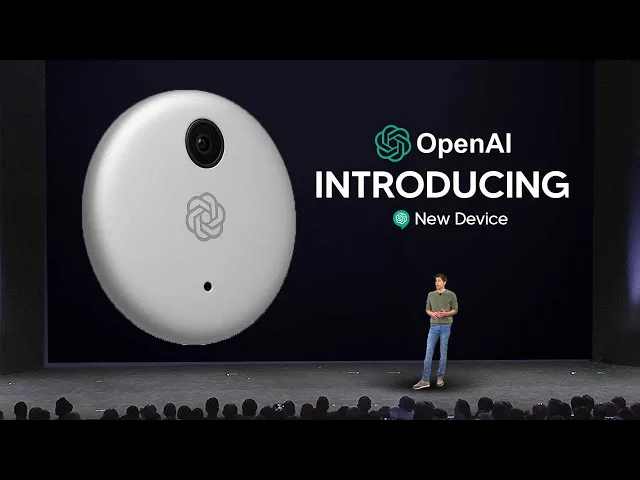OpenAI’s New Device Will Change AI Forever (OpenAI’s IO Device Revealed)

OpenAI's io signals new computing era
OpenAI has unveiled something truly remarkable, and it's not another language model update. The AI powerhouse announced a secretive hardware project called "io" that could fundamentally transform how we interact with artificial intelligence. This new device represents OpenAI's first major foray into consumer hardware, potentially positioning them as a direct competitor to industry giants like Apple.
What makes OpenAI's io device significant
-
A radical interface reimagining: Unlike traditional computers with keyboards and screens, io appears designed around voice-first interaction, leveraging OpenAI's powerful language models to create a more natural computing experience.
-
Strategic hardware expansion: This marks OpenAI's evolution beyond software into becoming a full-stack AI company, controlling both the intelligence layer and the physical devices through which we access it—similar to Apple's successful hardware-software integration strategy.
-
Talent acquisition reveals ambition: OpenAI has assembled an impressive team from Apple, including former design chief Jony Ive, alongside executives from Microsoft, Anthropic, and even Stripe's co-founder—signaling a serious commitment to revolutionizing consumer technology.
-
Potential industry disruption: If successful, io could fundamentally alter the computing landscape by shifting away from screens and apps toward ambient, conversational AI that's accessible throughout our environments.
Why this matters more than you might think
The most compelling aspect of OpenAI's hardware ambitions isn't just the device itself but what it represents: a fundamental shift in computing paradigms. For decades, we've interacted with computers through increasingly refined versions of the same basic interface—screens, keyboards, and pointing devices. The io device appears poised to break this pattern by prioritizing conversation as the primary interface.
This matters tremendously for businesses because it signals the beginning of the post-smartphone era. Just as mobile computing disrupted desktop-centric business models in the 2010s, conversational AI devices could similarly transform how companies deliver services, interact with customers, and design products. Organizations that recognize this shift early will have significant advantages in adapting their operations and offerings to this new paradigm.
Beyond the announcement: implications and possibilities
What OpenAI hasn't addressed—and what business leaders should consider—is how this device might transform workplace productivity. Imagine executives dictating
Recent Videos
How To Earn MONEY With Images (No Bullsh*t)
Smart earnings from your image collection In today's digital economy, passive income streams have become increasingly accessible to creators with various skill sets. A recent YouTube video cuts through the hype to explore legitimate ways photographers, designers, and even casual smartphone users can monetize their image collections. The strategies outlined don't rely on unrealistic promises or complicated schemes—instead, they focus on established marketplaces with proven revenue potential for image creators. Key Points Stock photography platforms like Shutterstock, Adobe Stock, and Getty Images remain viable income sources when you understand their specific requirements and optimize your submissions accordingly. Specialized marketplaces focusing...
Oct 3, 2025New SHAPE SHIFTING AI Robot Is Freaking People Out
Liquid robots will change everything In the quiet labs of Carnegie Mellon University, scientists have created something that feels plucked from science fiction—a magnetic slime robot that can transform between liquid and solid states, slipping through tight spaces before reassembling on the other side. This technology, showcased in a recent YouTube video, represents a significant leap beyond traditional robotics into a realm where machines mimic not just animal movements, but their fundamental physical properties. While the internet might be buzzing with dystopian concerns about "shape-shifting terminators," the reality offers far more promising applications that could revolutionize medicine, rescue operations, and...
Oct 3, 2025How To Do Homeless AI Tiktok Trend (Tiktok Homeless AI Tutorial)
AI homeless trend raises ethical concerns In an era where social media trends evolve faster than we can comprehend them, TikTok's "homeless AI" trend has sparked both creative engagement and serious ethical questions. The trend, which involves using AI to transform ordinary photos into images depicting homelessness, has rapidly gained traction across the platform, with creators eagerly jumping on board to showcase their digital transformations. While the technical process is relatively straightforward, the implications of digitally "becoming homeless" for entertainment deserve careful consideration. The video tutorial provides a step-by-step guide on creating these AI-generated images, explaining how users can transform...
